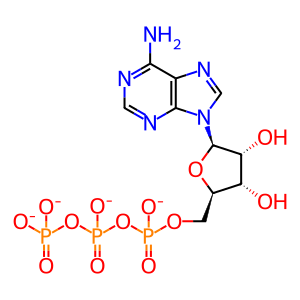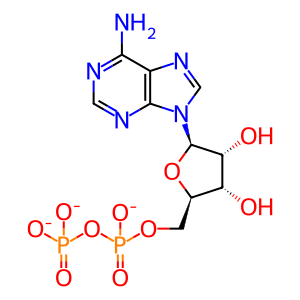Reaction: Autocatalytic phosphorylation of FGFR2 point mutants with enhanced kinase activity
- in pathway: Activated point mutants of FGFR2
Several missense mutations in the tyrosine kinase domain of FGFR2 have been identified in Crouzon syndrome and similar craniosynostosis disorders (Kan, 2002; Cunningham, 2007). The N549H and K660N mutations identified in FGFR2 in craniosynostosis disorders are paralogous to FGFR3 N540K and K650N/E mutations identified in hypochondroplasia and thanatophoric dysplasia II (Bellus, 2000). In FGFR3, these mutations have been demonstrated to have weak ligand-independent autophosphorylation and enhanced kinase activity mediated by disruption of a hydrogen-bonding network that holds the receptor in an inactive conformation (Chen, 2007; Bellus, 2000, Raffioni, 1998).
Characterization of FGFR2 proteins containing somatic mutations at these residues support the notion that they have elevated levels of kinase activity. FRS2 is constitutively phosphorylated in the FGFR2 N549K kinase mutant identified in endometrial tumors and knockdown of N549K with short hairpin RNAs or the pan-FGFR inhibitor PD170734 inhibits cell survival in endometrial cancer cells lines, suggesting that FGFR2 activity is required for tumor cell survival. FGFR2 knockdown also results in a significant decrease in the levels of phosphorylated Erk1/2 (Dutt, 2008; Byron, 2008; Pollock, 2007). Crystal structures of FGFR2 kinase mutants N549H and K650N show that the mutations disengage an 'auto-inhibitory brake' on the kinase domain of the receptor. Biochemically, the FGFR2 N549K and K660E mutants show elevated kinase activity relative to the unphosphorylated wild-type protein and have increased activity towards peptide substrates; this activity is stimulated upon receptor phosphorylation, but to a lesser extent than seen with the wild-type receptor (Chen, 2007).
Characterization of FGFR2 proteins containing somatic mutations at these residues support the notion that they have elevated levels of kinase activity. FRS2 is constitutively phosphorylated in the FGFR2 N549K kinase mutant identified in endometrial tumors and knockdown of N549K with short hairpin RNAs or the pan-FGFR inhibitor PD170734 inhibits cell survival in endometrial cancer cells lines, suggesting that FGFR2 activity is required for tumor cell survival. FGFR2 knockdown also results in a significant decrease in the levels of phosphorylated Erk1/2 (Dutt, 2008; Byron, 2008; Pollock, 2007). Crystal structures of FGFR2 kinase mutants N549H and K650N show that the mutations disengage an 'auto-inhibitory brake' on the kinase domain of the receptor. Biochemically, the FGFR2 N549K and K660E mutants show elevated kinase activity relative to the unphosphorylated wild-type protein and have increased activity towards peptide substrates; this activity is stimulated upon receptor phosphorylation, but to a lesser extent than seen with the wild-type receptor (Chen, 2007).
Reaction - small molecule participants:
ADP [cytosol]
ATP [cytosol]
Reactome.org reaction link: R-HSA-2033490
======
Reaction input - small molecules:
ATP(4-)
Reaction output - small molecules:
ADP(3-)
Reactome.org link: R-HSA-2033490


